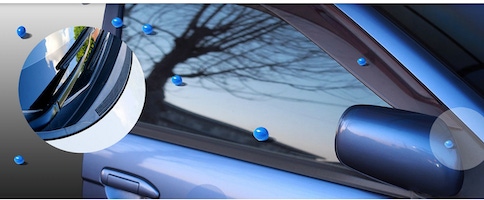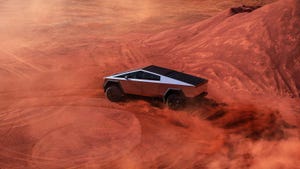Weatherproof TPEs target auto exterior applications
Kraiburg TPE has debuted a series of thermoplastic elastomers (TPEs) that were specially developed to deliver weathering resistance coupled with adhesion to polypropylene (PP) resin and UV resistance in automotive applications.
August 21, 2019

Kraiburg TPE has debuted a series of thermoplastic elastomers (TPEs) that were specially developed to deliver weathering resistance coupled with adhesion to polypropylene (PP) resin and UV resistance in automotive applications. The new compounds of the Thermolast K UV/HF/SF family are intended primarily for automotive exterior applications such as water deflectors and window encapsulation.
Plastics used in exterior automotive applications can be exposed to severe weather influences, especially on vehicles. These applications often require a weatherproof plastic material that can withstand the negative impact ultraviolet (UV) radiation can have on the visual appearance and mechanical properties of automotive parts. Therefore, it is usually wise for weatherproof plastics to be somewhat UV resistant since UV radiation can have an especially high impact on materials used outdoors.
|
The latest Thermolast K UV/HF/SF series distinguishes itself by extreme UV and weathering resistance as well as its bondability to PP. The thermoplastic elastomers can be processed to a precise and even surface without weld line formation. This is achieved due to the excellent flow properties of the TPE.
These TPE compounds can also be processed easily and precisely by two-component injection molding. Here, they form a very good bond to the rigid PP component. Using the multi-component injection molding process, the best bonding property can be achieved, additional assembly steps are no longer necessary, and the cycle time of the component is reduced.
UV/HF/SF Thermolast K TPEs provides a broad spectrum of benefits such as increasing the value of design, economic processing and expansion of product functions. They meet the typical requirements of different areas of use and the automotive industry, including the PV3929 Kalahari natural weathering test for two year cycles and the PV3930 Florida test for outdoor use. This allows more potential exterior application in the automotive sector, such as in the Asia Pacific region, with its ever-changing weather, to ensure the vehicle achieve better performance over a longer time and hence, saving costs in maintenance of the vehicle.
About the Author(s)
You May Also Like





